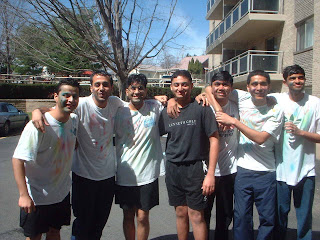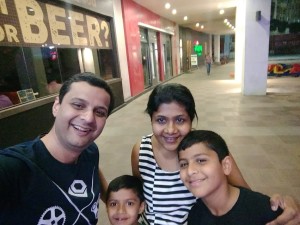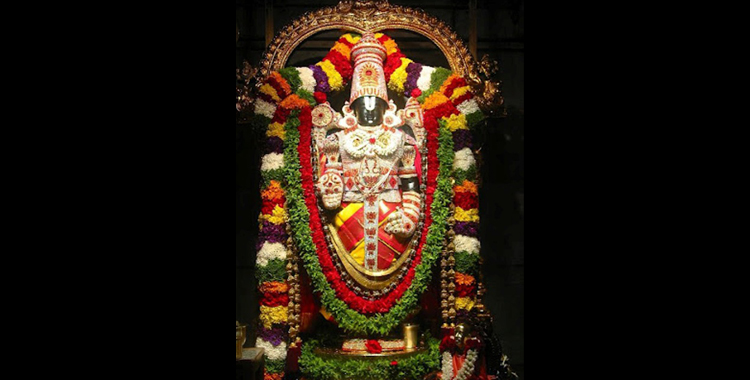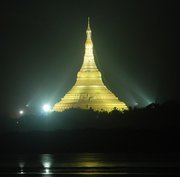This story dates back to 2002. It’s about a pretty girl named Bhumika Patel, an engineering graduate from India who wanted to pursue a master’s degree at The Pennsylvania State University, USA. For first hand information she contacted Nipun Patel, a graduate student at the Computer Engineering Department, PSU. This story is about both of them.
Nipun was a tall, lanky guy from Ahmedabad, India. He stayed off campus at 3105, Plaza Drive, along with three other room mates. Vishal – ‘The Big Boss’, Jay (yours truly) – ‘The Playboy’ and Divya (male, age – 22) – ‘The Silent Killer’. For us he was ‘Bhaiyo’, meaning brother in Gujarati. Nipun didn’t like the name; after all he was now in the United States of America. He preferred to be addressed as ‘Andy Patel’, his initials were N.D.
For the Indian students, 3105, Plaza Drive, was like the Indian Embassy (actually more of a ‘Dharamshala’) where anyone could walk in and steal a free lunch. We always had good food in the house, open 24/7.
 |
| L-R: Jay, Atin, Vishal, Divya, Nigam, Alok, Nipun |
The University Park campus of the Pennsylvania State University was a popular choice for the engineering graduates from India.
There were more than 500 Indian students on campus. There were also plenty of mid-age Indian professors who bonded well with the student community and supported generously with research scholarships. The tradition at PSU was that each incoming Indian student at the University was assigned a student mentor who would answer the pre-arrival queries, make arrangements for temporary accommodation on arrival and ensure that things like opening a bank account, signing the apartment lease were taken care of. Bhumika chose Nipun to be her mentor.
“Hi, my name is Bhumika Patel,” a long pause, “uh…from Ahmedabad. This message is for Nipun Patel. I wish to come to Pennsylvania State University for MS in computer engineering. I got your contact from the college website. Like you, I am a Patel from Ahmedabad and so I thought I should talk to you before coming. Please contact me. My email is..,”. The answering machine went silent after her message was heard by everyone in the apartment.
All eyes in the room turned to Nipun. He had just returned home and the first thing he did was hit the answering machine, as if he was expecting this message. “You guys don’t even check the messages!” he complained. It was customary that the first person who returned home would play the messages. On that day, all of us were at home but no one checked the messages. We were busy in the kitchen cooking Pav-Bhaji.
“Bhaiyo, you lucky guy,” said Divya, “a Patel girl, that too from Ahmedabad.”
“You anyways wanted to marry a Patel!” I teased Nipun, reminding him of what he had once said to me.
Vishal reminded Nipun of the Penn State ‘Indian’ culture of helping the incoming students. “Bhaiyo, make sure that you reply soon,” instructed Vishal who always behaved as if he was the head of the family.
Nipun didn’t look too interested in the call. He had better things to do; the most important was getting a scholarship to pay for his college tuition. The second priority was finding a ‘female, American, Undergrad,’ dance partner each week (Apparently no girl wanted to partner him the second time). He never missed the weekend ‘Salsa’ dance lessons at the university entertainment Hub.
A week later Nipun replied. “Bhumika, Penn State is good, but not good…. I mean funding. You can come here if not getting anywhere. Ok. I have class, going now. Email later if you want information.” Nipun really had to go…to sleep.
Disappointed with the reply she wrote back, “Looks like you are not interested in helping me. Can you give me the contact of someone who can help me?” These messages were being exchanged on the incoming students’ e-groups (there was no Facebook then).
Soon, she was flooded with replies from the other Indian guys at Penn State. They had just seen her profile picture. “If she comes to Penn State she would be a serious contender for the ‘Miss University’ crown,” the guys discussed amongst themselves. She looked gorgeous. Fair complexion, sharp features, black eyes, long hair…. On first looks, anyone could have mistaken her to be a Hindi movie actress.
All of a sudden Nipun decided to respond to her queries. He ensured that he answered all her questions. In detail.
Soon they started exchanging emails more often. Like the other Indian guys on campus, Nipun too added her to the list of friends on MSN messenger. Online chat was popular then. The students had a habit of being ‘logged in’ at all times. Chat time was well utilized; assignments and project reports were prepared in between the chats. Bhumika had messages blinking on her desktop, non-stop, one after another. Guys kept waiting for her reply. Strangely though, she would only respond to Nipun.
Divya complained, “How come she only chats with you?”
“Once Bhaiyo logs off, she logs out too,” I remarked.
“And vice-versa!” added Alok, our close friend
Nipun pretended as if he knew nothing. But deep within, he enjoyed being the chosen one. Her chemistry with him was perfect. The reactions on his face said it all.
“She’s coming!” he informed us after she told him about her admit from PSU. The excitement and happiness reflected in everything he did. ‘Bhaiyo’ became ‘Andy – The Lover Boy’. Her admission to Penn State was his biggest achievement. The reward was on its way.
A month and half passed, and the semester starting fall 2002 was fast approaching. During this period, Nipun and Bhumika got close to each other, online. He would chat with her all night and into the early hours of the morning. We would often peep-in to his laptop to check the context of their conversation. She too could be spotted online during his day hours. The time difference between India and US did not matter to them.
Nipun had already started counting days backwards. For him, the wait was getting difficult. Everything was closing in until one day. For Nipun it was doomsday.
Bhumika wasn’t coming to Penn State. She had family problems which she couldn’t share with Nipun.
“So what!” said Divya, “We shall meet her when we go to Ahmedabad in December.” Divya was also from Ahmedabad.
“Relax dude, I’ll find you a better girl in PSU,” I consoled Nipun.
Thereafter, Bhumika was rarely spotted on the messenger. Nipun would send her emails but she wouldn’t answer. He was beginning to get restless. He couldn’t call her because he had no phone number; they had always chatted online. Suddenly from ‘Bhaiyo’ to ‘Andy – The Lover Boy’ to ‘Devdas’, we never ran out of new names.
There couldn’t have been a greater co-incidence that the Hub on campus was screening the Hindi movie Devdas starring Shahrukh Khan on the Diwali weekend. Diwali, like all Indian festivals, was well celebrated by the Indians in town. On Diwali night all four of us decided to feast at the Indian Pavilion, a popular restaurant, in the company of close friends, Alok, Atin, Binu, Nigam and Prachi. Dinner was accompanied with some fine wine.
In high spirits, Binu John spoke of how much he enjoyed being with our group. We were very closely bonded – living together; cooking Sanjeev Kapoor recipes, celebrating birthdays, pillow-fights, late night discussions and debates had become a way of life. Away from home, this was the family each one could confide in. A family by choice. We poured our hearts out that night.
Besides recounting the good experiences, it was the first time that everyone shared what they didn’t like about the others in the group. It was a day of confessions and complaints, all of which were to be forgiven and forgotten. There couldn’t have been a better occasion to do it than Diwali. Some New Year resolutions were made for the family.
While all of this was happening, Divya and I looked at each other. We were both thinking about Bhumika.
 |
| Celebrating Diwali, Festivals, Birthdays |
“I have something to confess to Nipun,” I told the group. Almost everyone except Nipun knew what was coming. “There is no Bhumika Patel. There is only bhumikap@hotmail.com and you can login with the password ‘Bhaiyo’.”
For a moment, Nipun was stunned. But he knew me well and would not be fooled so easily. He was confident that this was just another prank. More than that, he had known Bhumika for over three months. How could she be unreal?
That night, the lights in Nipun’s room did not go off. Not because it was Diwali but because he could login as Bhumika Patel. Bhumika was a creation of the ‘family members’. A story scripted by yours truly, enacted by all.
It had all started the night when Nipun heard the message on the answering machine. Earlier in the evening, Divya ,Vishal and me were at Nigam and Prachi’s residence when we decided to play this prank with Nipun. Prachi was responsible for the messages on the answering machine. I communicated through emails. Everyone in the group could access the fictitious hotmail account. We voluntarily took turns to chat – day and night. And the profile picture was that of Bhumika Chawla, a relatively-unknown, aspiring Hindi film actress then.
Nipun lived with us for a month thereafter but was never as comfortable as he used to be. He soon moved to a different apartment. Divya and I returned to India after graduating in December 2002. Nigam and Prachi continued to live in Penn State until Nigam got his PhD. Vishal married Aparana; they shared an apartment with Alok. Atin was the first to get a job, he moved to Microsoft in Seattle. Binu would some day return to his real family in NY. Everyone forgot about the incident, except one person.
Six months later, in April 2003, my hotmail account was hacked.
“I can do it too – Nipun D. Patel.”
27th July, 2009







